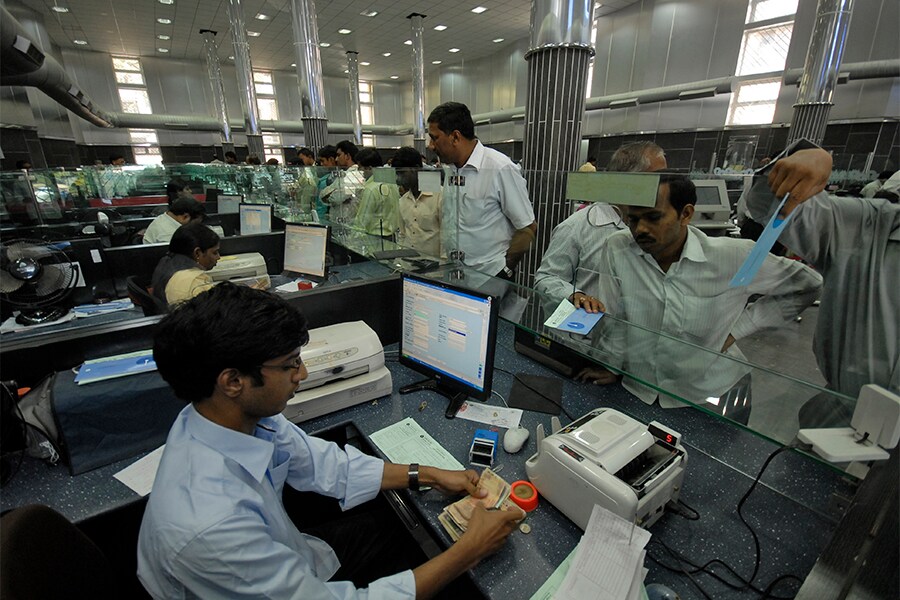Bank stocks jump on NPA-linked tax concession
But disappointed in absence of new bank recapitalisation move



Image: Krishnendu Halder / Reuters
Union Budget 2017-18 presented by Finance Minister Arun Jaitley was a mixed bag for the banking sector. There was a tax concession provided to banks to deal with non-performing assets (NPAs), but there was no specific or special announcement on further recapitalisation of state-run banks.
But banking stocks rose – in line with the overall stock market – reacting to the broader positives relating to handling the fiscal deficit, dealing with cleaning up black money and the thrust to infrastructure spending, which Jaitley announced on Wednesday.
The government also did not announce any move to create a “bad bank” – one that would absorb the non-performing assets of other state-run banks and help resolve them at a faster pace.
The S&P BSE Bankex index, comprising top private and public bank stocks, rose by 2.76 percent or 615.42 points to 22,927.29 points, with Bank of Baroda, Federal Bank, IndusInd Bank and ICICI Bank all recording more than four percent gains, over their previous closing levels.
The direct positive for the banking sector came in the form of a tax relief relating to the treatment of bad loans. This, considering that most banks in India, including several state-run banks, are grappling with high non-performing asset levels and trying to reduce stressed asset levels, will be a positive for the industry.
Jaitley said the “allowable provision for non-performing asset of banks increased from 7.5 percent to 8.5 percent. Interest taxable on actual receipt instead of accrual basis in respect of NPA accounts of all non-scheduled cooperative banks also to be treated at par with scheduled banks.”
Experts who Forbes India spoke to said banks which were making provisions of 7.5 percent of their operating profit will get a concession, as this amount as a tax deductible will now be higher, at 8.5 percent. “This essentially means that the provision cover for banks will go up they will be in a position to make higher provisions due to the tax relief,” Krishnan Sitaraman, senior director at Crisil Ratings told Forbes India.
Shanti Ekambaram, president (consumer banking) with private lender Kotak Mahindra Bank, said the new tax relief would benefit the banking system. But she felt that the bank recapitalisation move of Rs 10,000 crore is “too small”.
Two of India’s large banks, ICICI Bank and Axis Bank, have, this month, reported weak Q3 FY17 earnings and were impacted by higher provisions for bad loans and weak asset quality. ICICI Bank reported a 19 percent slide in profit to Rs 2,441.82 crore for the three months to December 2016, compared with Rs 3,018.13 crore a year ago. Provisions for bad loans for the April to December 2016 period jumped by 84 percent to Rs 8,723 crore, against Rs 4,742 crore a year earlier.
Axis Bank reported a 74 percent drop in net profit, as provisions in the third quarter of FY17 rose to Rs 3,796 crore, up nearly six fold from Rs 713 crore a year earlier.
But the 2017-18 budget was a bit of a dampener as Jaitley did not announce any new moves relating to recapitalisation of state-run banks. He announced the recapitalisation of Rs 10,000 crore for banks, but this is part of the broader, and already announced, plan of the Narendra Modi-led government in 2015. The government had announced an allocation of Rs 70,000 crore over four years to reinforce the capital base for banks.
“The budget is a mixed bag for the banking Industry. (There was) nothing substantial announced on dealing with NPAs,” Sapan Gupta, national practice head (banking and finance), Shardul Amarchand Mangaldas & Co, said in an email.
First Published: Feb 01, 2017, 15:52
Subscribe Now